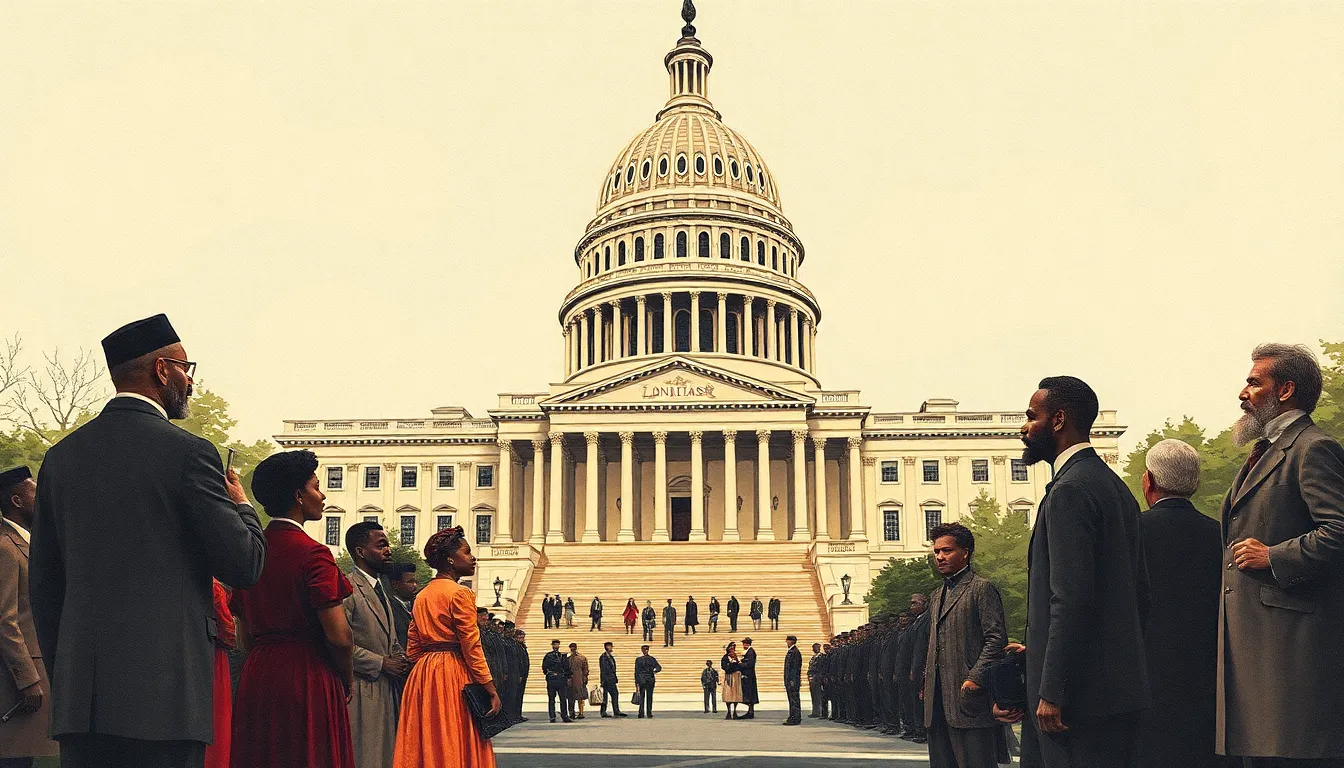The Fourteenth Amendment isn’t just a dusty old piece of parchment; it’s the superhero of the Constitution, swooping in to protect rights and ensure justice. This amendment packs a punch with its clauses, but one in particular stands out like a neon sign in a dark alley. It’s a game changer, redefining how citizens interact with the law and each other.
Curious about what this clause means for everyday life? You’re not alone. Many folks are scratching their heads, wondering how something written over 150 years ago still matters today. Spoiler alert: it’s more relevant than ever! Buckle up as we dive into the fascinating world of constitutional law, where history meets modern-day implications, and discover why this Fourteenth Amendment clause is the talk of the town.
Table of Contents
ToggleOverview of the Fourteenth Amendment
The Fourteenth Amendment, ratified in 1868, comprises five sections that primarily address citizenship rights and equal protection under the law. Section 1 asserts that all persons born or naturalized in the United States are citizens, directly countering the Dred Scott decision of 1857. Equal protection clauses prohibit states from denying any individual the same legal protections afforded to others.
Due process clauses further safeguard individuals against arbitrary actions by state authorities. Those guarantees ensure fair treatment in legal proceedings and protect civil liberties, adding a layer of security to constitutional rights. Section 2 modifies the way representatives are apportioned, penalizing states that deny the right to vote to male citizens.
Moreover, Section 3 disqualifies individuals who supported insurrection or rebellion from holding office. This historical context highlights the amendment’s intent to reshape governance in a post-Civil War America. Section 4 protects public debt, ensuring the government honors financial obligations incurred during the war.
Ever since its enactment, the Fourteenth Amendment has served as a critical tool in civil rights movements, influencing major Supreme Court cases. Landmark judgments like Brown v. Board of Education utilized its principles to combat racial segregation in schools. As society evolves, interpretations of the amendment adapt, making it relevant in discussions about immigration, gender equality, and voting rights—a testament to its lasting impact on American law and culture.
Historical Context

The historical context of the Fourteenth Amendment reflects its significant role in shaping civil rights. This amendment emerged during a transformative period in American history.
Background of the Fourteenth Amendment
Ratified on July 9, 1868, the Fourteenth Amendment came in response to the aftermath of the Civil War. Its primary goal focused on securing citizenship rights for formerly enslaved individuals. Legal protections ensured that all persons, born or naturalized, could claim citizenship. This amendment addressed the gaps left by previous rulings, particularly the Dred Scott decision of 1857, which denied citizenship to African Americans. Provisions for equal protection and due process emerged as critical components to safeguard rights against state infringements.
Significant Events Leading to Its Ratification
The ratification of the Fourteenth Amendment followed a series of pivotal events. The Civil War concluded in 1865, setting the stage for profound societal change. Congress proposed the amendment in 1866, responding to the need for legal frameworks protecting newly freed individuals. The Reconstruction Era saw intense debates over citizenship and civil rights. Various Southern states enacted Black Codes, aiming to restrict the freedoms of African Americans. Advocacy from abolitionists and civil rights activists influenced public opinion and political pressure. Ultimately, these events culminated in the amendment’s ratification, marking a vital turning point in American law and society.
Key Provisions of the Fourteenth Amendment
The Fourteenth Amendment includes essential clauses that protect individual rights and ensure equal treatment under the law. Two key components stand out: the Due Process Clause and the Equal Protection Clause.
Due Process Clause
The Due Process Clause ensures that no individual faces arbitrary denial of life, liberty, or property. This provision mandates fair legal procedures before the government can impose penalties or restrictions. State authorities must follow established legal processes to avoid infringing on personal rights, guaranteeing individuals an opportunity to defend themselves. Legal precedents, such as the landmark case of Gideon v. Wainwright, illustrate its application in securing the right to counsel. Protection against unjust treatment emerges as a cornerstone of this clause, making it fundamental in civil rights discussions.
Equal Protection Clause
The Equal Protection Clause prohibits states from denying any person equal protection under the law. This clause serves to eliminate discrimination based on race, gender, and other characteristics. Its implications extend to various spheres, influencing legal rulings on issues like affirmative action and same-sex marriage. Landmark cases, such as Brown v. Board of Education, showcase its role in dismantling institutionalized racial segregation. By establishing a framework for equality, this clause promotes fairness across all legal contexts, reinforcing the principle that all individuals deserve equal legal rights and protections.
Implications of This Fourteenth Amendment Clause Means That
The Fourteenth Amendment significantly shapes civil rights and legal standards in the United States. Its clauses serve to protect individual liberties and ensure equality under the law.
Impact on Civil Rights
Civil rights advancements owe much to the Fourteenth Amendment. Its Equal Protection Clause provides a basis for challenging discriminatory practices. Landmark cases like Brown v. Board of Education stem from the amendment, leading to the end of school segregation. The amendment also empowers advocacy for gender equality, impacting rulings that support women’s rights. Various movements leverage this constitutional framework, promoting justice and equity across multiple domains. Modern debates surrounding immigration reflect its enduring relevance, showcasing its role in advocating for the rights of all individuals.
Influence on Legal Precedents
Legal precedents frequently cite the Fourteenth Amendment. Courts rely on its Due Process Clause to evaluate fairness in judicial proceedings. Gideon v. Wainwright exemplifies how the amendment protects the right to counsel. Similarly, the Equal Protection Clause informs rulings affecting affirmative action and LGBTQ+ rights. Its broad interpretations ensure protections extend to marginalized groups, influencing significant decisions across the legal landscape. Ongoing discussions around voting rights highlight the amendment’s adaptability to emerging legal challenges.
Modern Interpretation and Relevance
Legal scholars frequently analyze the Fourteenth Amendment in light of contemporary issues. The amendment remains pivotal in discussions surrounding civil rights, reflecting societal values in the legal system. Prominent cases such as Obergefell v. Hodges, which legalized same-sex marriage, underscore its significance in advancing equality. Advocacy groups utilize the Equal Protection Clause to challenge injustices and promote legislative changes.
Among its provisions, the Due Process Clause plays a vital role in shaping modern judicial standards. Courts apply this clause to ensure fair legal proceedings, reinforcing rights across diverse contexts. Landmark decisions like Roe v. Wade illustrate the ongoing relevance of the amendment in protecting individual freedoms. Shifts in societal norms continuously influence how courts interpret its clauses.
Ongoing debates about immigration highlight the adaptability of the Fourteenth Amendment. Many argue for its application in protecting the rights of undocumented immigrants, invoking its citizenship protections. As a result, discussions about voting rights also frequently reference the amendment. The principle of equal access to the ballot box remains a significant and evolving concern.
Overall, its historical roots provide a foundation for legal advocacy today. Organizations advocating for justice leverage its tenets to argue for reforms and expanded rights. Advocacy for gender equity also heavily relies on the amendment in tackling discrimination. By focusing on its application, modern interpretations ensure that citizens benefit from its enduring protections.
The Fourteenth Amendment remains a cornerstone of American democracy and civil rights. Its clauses continue to shape the legal landscape ensuring that all individuals are treated equally under the law. As society evolves the amendment’s provisions adapt to address contemporary issues such as discrimination and individual freedoms.
The ongoing relevance of this amendment in court rulings and civil rights movements underscores its vital role in promoting justice and equity. Advocacy groups leverage its principles to challenge injustices and push for legislative reforms. With its rich history and robust framework the Fourteenth Amendment will likely continue influencing legal discourse for generations to come.




